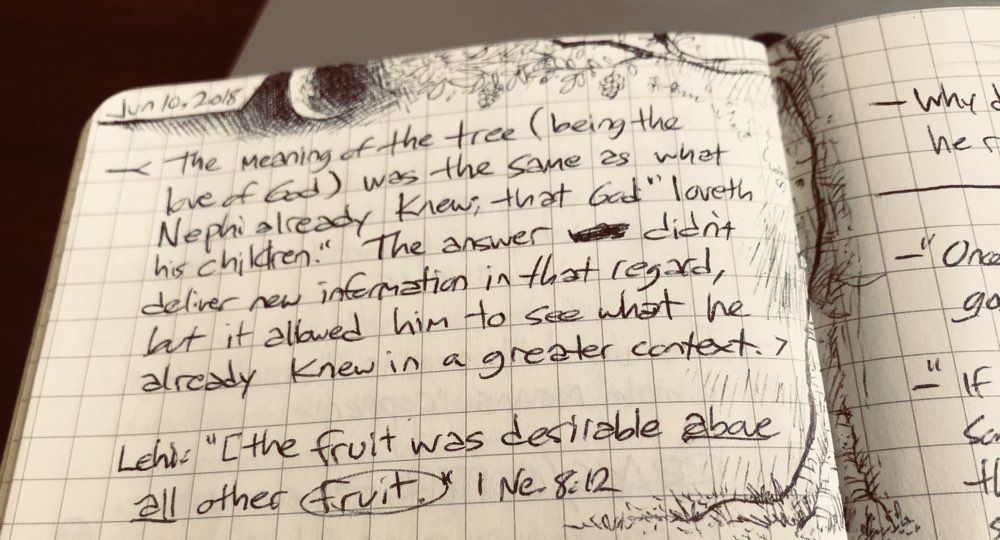- Good works are not substitutes for grace, they are expressions of obedience that foreshadow the disposition of the converted.
- “Therefore be imitators of God, as beloved children;” – Ephesians 5:1 NASB
- Sunday is just another day of the week, the Sabbath must be created, a sign between us and God.
- Prayer is a union of minds, we can unite with God or others around us.
- Key terms from the sermon on the mount:
- Meek = mild = non-violent
- Blessed = happy and prosperous
- Merciful = compassionate = a heart easily moved by the suffering or distress of others
- Pure = clean = free from foreign matter
- Peace = freedom from conflict
- We come unto Christ by drawing near to him, not in physical, but dispositional proximity.
- The word brass in Hebrew is nachosheth which means copper.
- Brass items in scripture include:
- Moses’ serpent
- Liahona
- Laban’s plates
- Temple basin on the back of 12 oxen
- Solomon’s 2 pillars
- Brass items in scripture include:
- “If there were no Book of Mormon, the promised gathering of Israel would not occur.” – Pres. Nelson
- The meaning of the tree in Nephi’s vision (the love of God) was the same as what he already knew about God, that he “loveth his children.” The answer didn’t deliver new information in that regard, but it allowed him to see what he already knew in a greater context. (Knowing is one thing, understanding the meaning is another).
- Lehi: “[the fruit] was desirable above all other fruit” – 1 Ne. 8:12
- Nephi: [the tree] is the most desirable above all things.” – 1 Ne. 11:22
- “My joy is more full because of the success of my brethren.” – Alma 29:14
Trending
- Was the Land of Mormon named after someone? If so, who?
- NEW Research Shows Mormon Encoded Lehi’s Vision into Alma’s Story with Temple Symbolism – The Stick of Joseph
- #40 – The Fountain of Filthy Water
- The Meaning of Isaiah 4:1 and Seven Women Taking Hold of One Man
- Lecture Five, the Godhead, and the Light We Missed
- Retaining brightness
- Sebus, Severed Arms, and Humility Unto Salvation
- oneClimbs on The Stick of Joseph: Alma’s Sermon



3 Comments
I like your analysis of brass/copper objects in the scriptures. I think there’s a symbolic meaning of metals in the Book of Mormon, but I can’t quite figure it out. 1 Nephi mentions all the metals that are in Nebuchadnezzar’s dream (the statue with the head of gold, chest of silver, loins of brass, & legs of iron). In fact, the metals of 1 Nephi appear in the same order: Lehi left his gold and silver, Nephi returned for the brass plates, Nephi obtained the steel sword of Laban (steel=carbonized iron), Lehi beheld a an iron rod in vision. Traditionally, the base metals are associated with heavenly bodies: sun-gold, moon-silver, Venus-copper, Mars-iron. Based on this tradition, gold and iron are masculine, silver and copper are feminine. It could be that the masculine metals represent justice and the feminine metals represent mercy….
Wow, really cool insights, I never noticed the order of metals as they appear in 1 Nephi, that would be something really intriguing to look into more. I was only thinking of the brass relics of the serpent, plates, and liahona. There is an article I’m working on that deals with the serpent and the liahona but I like the idea of additional study on all the other metals.
I think the categorizing meek as nonviolent as incomplete. Moses was certainly nonviolent but such a view misses out out the greatness of Moses. Meekness is also a willingness to follow the Good Shepherd.
That is why there is a parallel between meekness and sheep and a contrast in the scriptures with goats. I grew up in the country with both. Goats are hard to lead, they are stubborn and notorious for doing whatever they want. A friend of mine came home from school one day to find one of his goats stuck up in a tree. It had climbed up, but couldn’t figure out how to get down. Sheep in the other hand follow the shepherd wherever he goes.